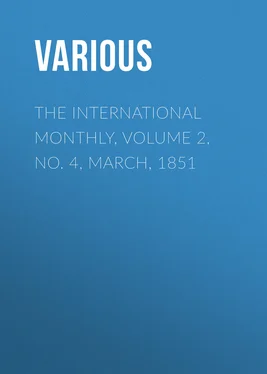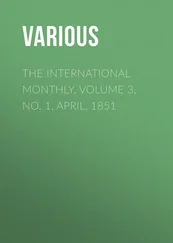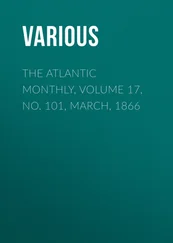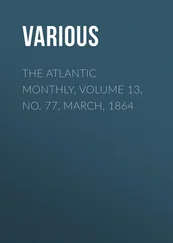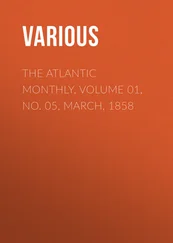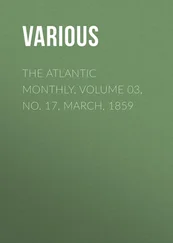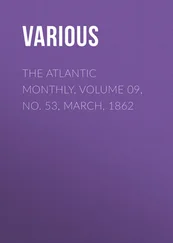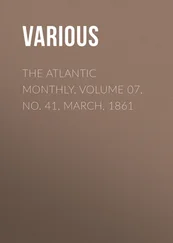Various - The International Monthly, Volume 2, No. 4, March, 1851
Здесь есть возможность читать онлайн «Various - The International Monthly, Volume 2, No. 4, March, 1851» — ознакомительный отрывок электронной книги совершенно бесплатно, а после прочтения отрывка купить полную версию. В некоторых случаях можно слушать аудио, скачать через торрент в формате fb2 и присутствует краткое содержание. Жанр: foreign_antique, periodic, foreign_edu, на английском языке. Описание произведения, (предисловие) а так же отзывы посетителей доступны на портале библиотеки ЛибКат.
- Название:The International Monthly, Volume 2, No. 4, March, 1851
- Автор:
- Жанр:
- Год:неизвестен
- ISBN:нет данных
- Рейтинг книги:5 / 5. Голосов: 1
-
Избранное:Добавить в избранное
- Отзывы:
-
Ваша оценка:
- 100
- 1
- 2
- 3
- 4
- 5
The International Monthly, Volume 2, No. 4, March, 1851: краткое содержание, описание и аннотация
Предлагаем к чтению аннотацию, описание, краткое содержание или предисловие (зависит от того, что написал сам автор книги «The International Monthly, Volume 2, No. 4, March, 1851»). Если вы не нашли необходимую информацию о книге — напишите в комментариях, мы постараемся отыскать её.
The International Monthly, Volume 2, No. 4, March, 1851 — читать онлайн ознакомительный отрывок
Ниже представлен текст книги, разбитый по страницам. Система сохранения места последней прочитанной страницы, позволяет с удобством читать онлайн бесплатно книгу «The International Monthly, Volume 2, No. 4, March, 1851», без необходимости каждый раз заново искать на чём Вы остановились. Поставьте закладку, и сможете в любой момент перейти на страницу, на которой закончили чтение.
Интервал:
Закладка:
M. Antoine D'Abbadie received not long ago from President Bonaparte, the decoration of the Legion of Honor, for alleged geographical discoveries in Africa. An "Inquiry" into M. Abbadie's journey has just appeared in London, from the hand of Dr. Charles T. Beke, and it is not impossible that the traveller will turn out a Damburger or a Hunter. Dr. Beke is an Englishman; D'Abbadie, an Irishman by birth, but a Frenchman by name, education and allegiance. The latter professes to have been the first European who ever put foot in the African Kingdom of Kaffa; the former gives reasons for doubting his statements entirely, and does not believe the Frenchman has even been in the country he describes at all.
The great oriental scholar Monsignore Molsa has been appointed to the office of Chief Guardian of the Vatican Library, in the room of M. Laureani, whose melancholy death occurred a few months ago; and the Abate Martinucci has been nominated to fill the office of sub-chief, which is one of very considerable importance, and has hitherto been filled by some of the most eminent of Italian scholars.
We are to have from Paris a hitherto unpublished ode of Piron, the well-known author of La Metromanie . It is entitled Les Confessions de mon Oreiller , (Confessions of my Pillow,) and is considered by connoisseurs to be decidedly authentic. It is signed and headed thus: "To be given to the public a hundred years after my death."
The vacancy occasioned by the death of M. Alban de Villeneuve-Bargemont, in the list of members of the French Academy of Moral and Political Sciences, has been filled by the election of M. Louis Reybaud, the author of Jerome Paturot , and husband of Madame Reybaud, who wrote the charming novels of Le Cadet de Calabriere , Helena , &c.
The sons of Rossi, the distinguished economist, and less distinguished minister of Pius IX., in which capacity he was assassinated, have published the third volume of his Cours d'Economie Politique . It treats of the distribution of wealth, and is marked by the same ability and tendencies as the volumes which preceded it, which were upon the production of riches.
H. Bailliere, the eminent publisher, of Paris, has established a branch of his house at 169 Fulton street, New-York, where American scholars may obtain all the best scientific literature of the time in suitable editions and at reasonable prices.
Of Mr. James Bailey, and the blasphemous rant and fustian and crude speculation which make up his poem of "Festus," which has had such extraordinary popularity among our transcendentalists, and which Shakspeare Hudson so excellently well reviewed in the Whig Review a year or two ago, we think a correspondent of The Tribune speaks justly in the following extract from a letter dated at Nottingham, in England:
"Apropos of Nottingham, I have seen Bailey, the author of 'Festus.' His father is proprietor of the Nottingham Mercury , and the editorial department rests with him. He is a heavy, thick set sort of man; of a stature below the middle size; complexion dark; and, in years about eight and thirty. His physiognomy would be clownish in expression, if his eyes did not redeem his other features. He spoke of 'Festus,' and of its fame in America, of which he seemed very proud. In England, it has only reached the third edition, while eight or nine have been published in the States. You know my opinion of the work. It is as far from being a great poem as the Thames, compared with the Mississippi or the Ohio, is from being a great river. Anxiously, anxiously have I sought one striking original idea in the whole poem (appalling in its length), but to no purpose. The transcendental literature of Germany absorbs all that, at first glance, arrests the attention. Without learning, imagination, or the attraction of a beautiful metre (like that of Tennyson's 'Princess'), I am at a loss to know what has given this poem its notoriety. Not its daring speculation, surely, for it is but a timid compromise between Orthodoxy and Universalism."
H. F. Clinton has published in London the concluding volume of his Fasti Romani : the civil and literary chronology of Rome and Constantinople from the death of Augustus to the death of Heraclius. The first volume, containing the chronological tables, was published in 1845, and formed a continuation of the Fasti Hellenici , by the same author. It came down to the death of Justin II., a. d. 578. The present volume continues the tables from the latter date to the death of Heraclius, a. d. 641; but the greater part of it consists of a series of learned dissertations on various points connected with the civil and literary history of the Roman and Byzantine empires.
Captain J. D. Cunningham, author of the "History of the Sikhs," who was dismissed from his political situation at Bhopal, by orders of the Court of Directors, for having published an official correspondence, without the permission of his immediate superiors, has been recalled to public employment by the Governor-General of India, Lord Dalhousie having just appointed him general superintending engineer in the north-western provinces.
Mr. Hepworth Dixon, author of "Howard and the Prison-World of Europe," has published in London a Life of William Penn, which will be republished immediately by Lea & Blanchard of Philadelphia.
The Literary Women of England were never so active as now. Mrs. Crowe has commenced in The Palladium magazine a new novel entitled Estelle Silvestre . Miss Anne G. Greene has published the third volume of her Lives of the Princesses of England ; Mrs. David Ogilvy, Traditions of Tuscany ; Mrs. Gordon, Musgrave, a Story of Gilsland Spa ; Maria de la Vaye, Eugenie, the Young Laundress of the Bastille ; Mrs. Norton, a new poem; the author of "Olivia," Sir Philip Hetherington ; Mrs. Ward, Helen Charteris, or Sayings and Doings in a Cathedral Town ; Mrs. Hubbach, niece of the celebrated Miss Austen, The Wife's Sister, or the Forbidden Marriage ; Mrs. Jameson, Legends of the Madonna , forming the conclusion of her series illustrating Sacred and Legendary Art; the authoress of "Mary Powell" has commenced in Sharpe's Magazine a new work of the same description, under the title of The Household of Sir Thomas More .
Miss Martineau began on the first of February, a serial work under the title of "Half a Century of the British Empire; a History of the Kingdom and the People, from 1800 to 1850." It will be in six volumes, and it is intended to present, in handsome octavos at a rate of extraordinary cheapness, a connected narrative of the most important era in the history of the modern world. The work of Macaulay professes to be "the history of England from the accession of King James the Second down to the time which is within the memory of men still living." "Half a Century of the British Empire," will chiefly deal with events and states of society during a period in which many of our contemporaries have lived and acted.
The correspondence of Robert Sutton, Lord Lexington, British Minister at Vienna in 1694, has just been published by Murray in London, having recently been discovered in the library of the Suttons, at Kilham. There is not much absolute value in their contents, historically speaking; but the letters supply several striking and some amusing illustrations of characters already known in history, and are a contribution really important to the history of manners and society at the seventeenth century. The non-official letters are in this respect most curious and entertaining.
Pensions of £100 a year each have been granted in England to Mrs. Belzoni, the aged widow of the celebrated traveller; and to Mr. Poole, the author of Paul Pry , and of many contributions to periodical literature, who is a great sufferer from bodily infirmities.
Читать дальшеИнтервал:
Закладка:
Похожие книги на «The International Monthly, Volume 2, No. 4, March, 1851»
Представляем Вашему вниманию похожие книги на «The International Monthly, Volume 2, No. 4, March, 1851» списком для выбора. Мы отобрали схожую по названию и смыслу литературу в надежде предоставить читателям больше вариантов отыскать новые, интересные, ещё непрочитанные произведения.
Обсуждение, отзывы о книге «The International Monthly, Volume 2, No. 4, March, 1851» и просто собственные мнения читателей. Оставьте ваши комментарии, напишите, что Вы думаете о произведении, его смысле или главных героях. Укажите что конкретно понравилось, а что нет, и почему Вы так считаете.
